Leading Transformative Change Through
Innovation, Education and Collaboration
Factor-Inwentash Faculty of Social Work
2025-2030 Academic Plan
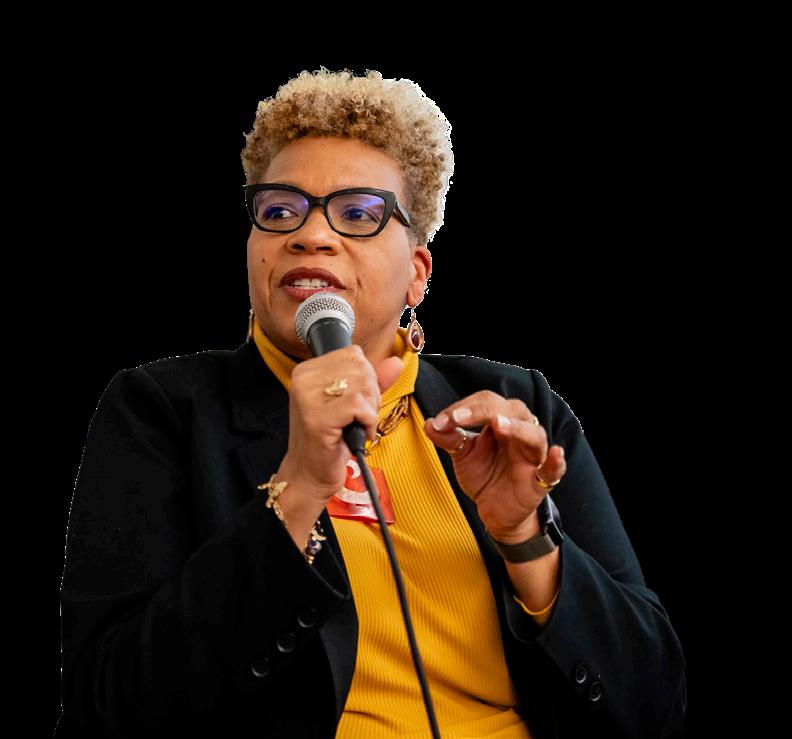
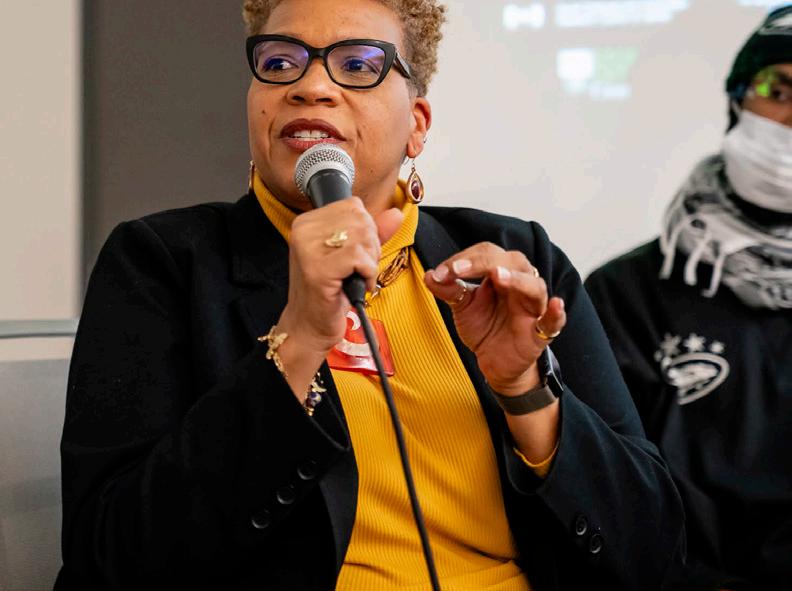
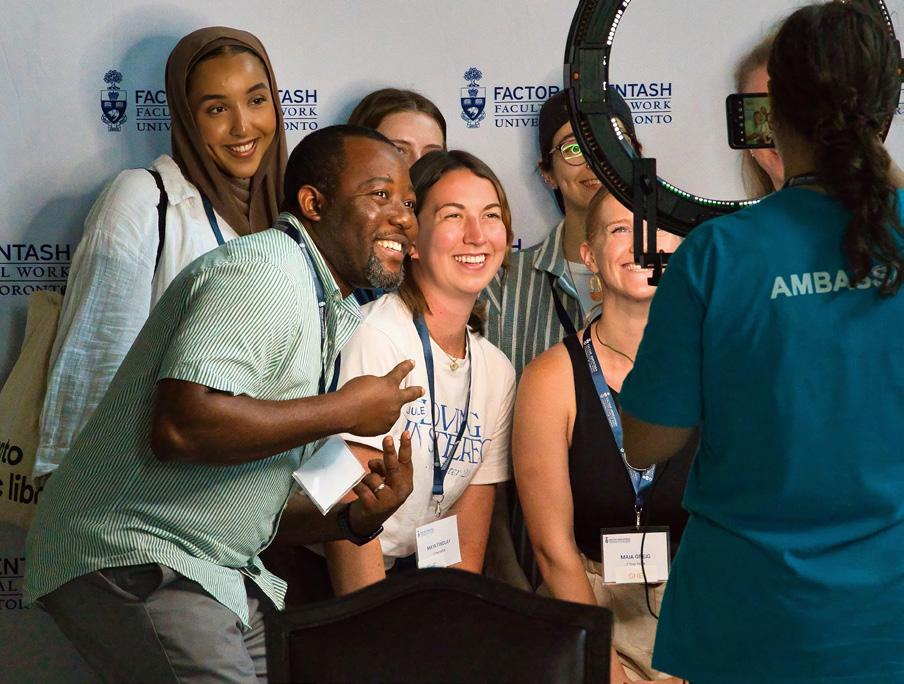
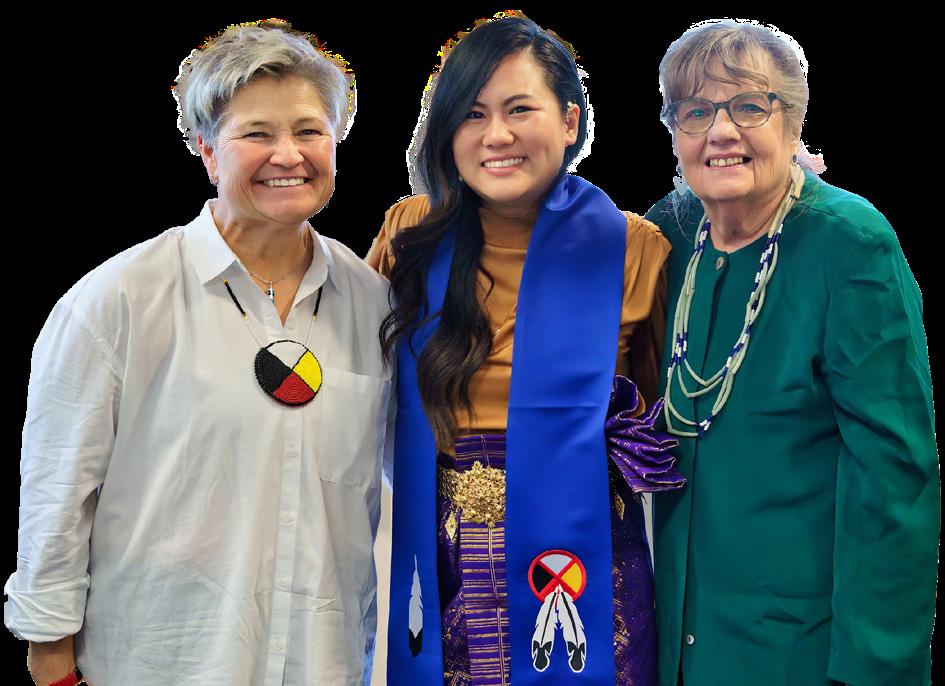

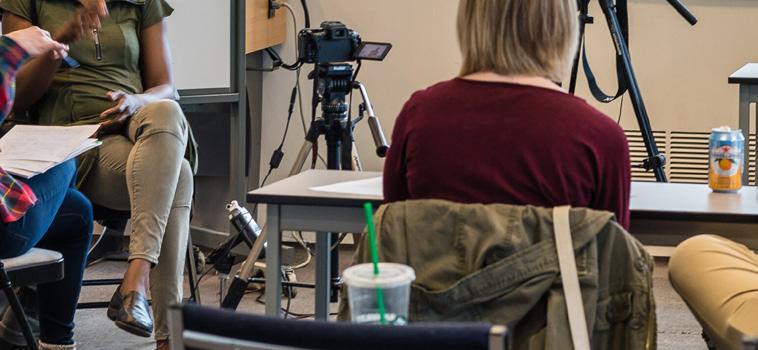

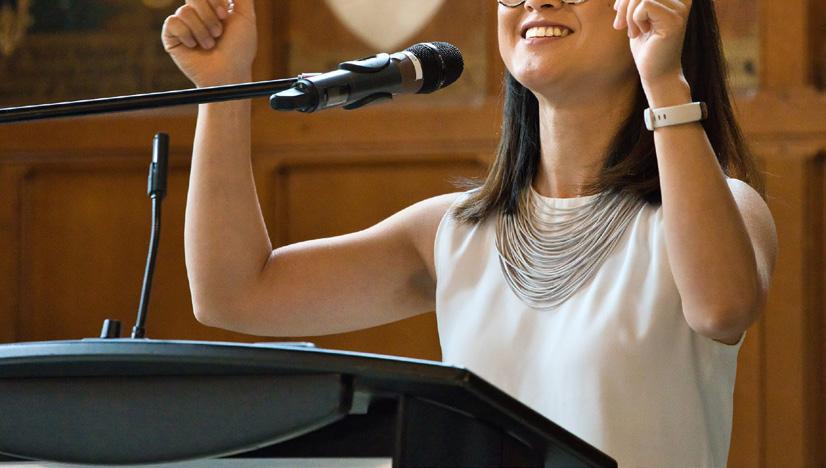


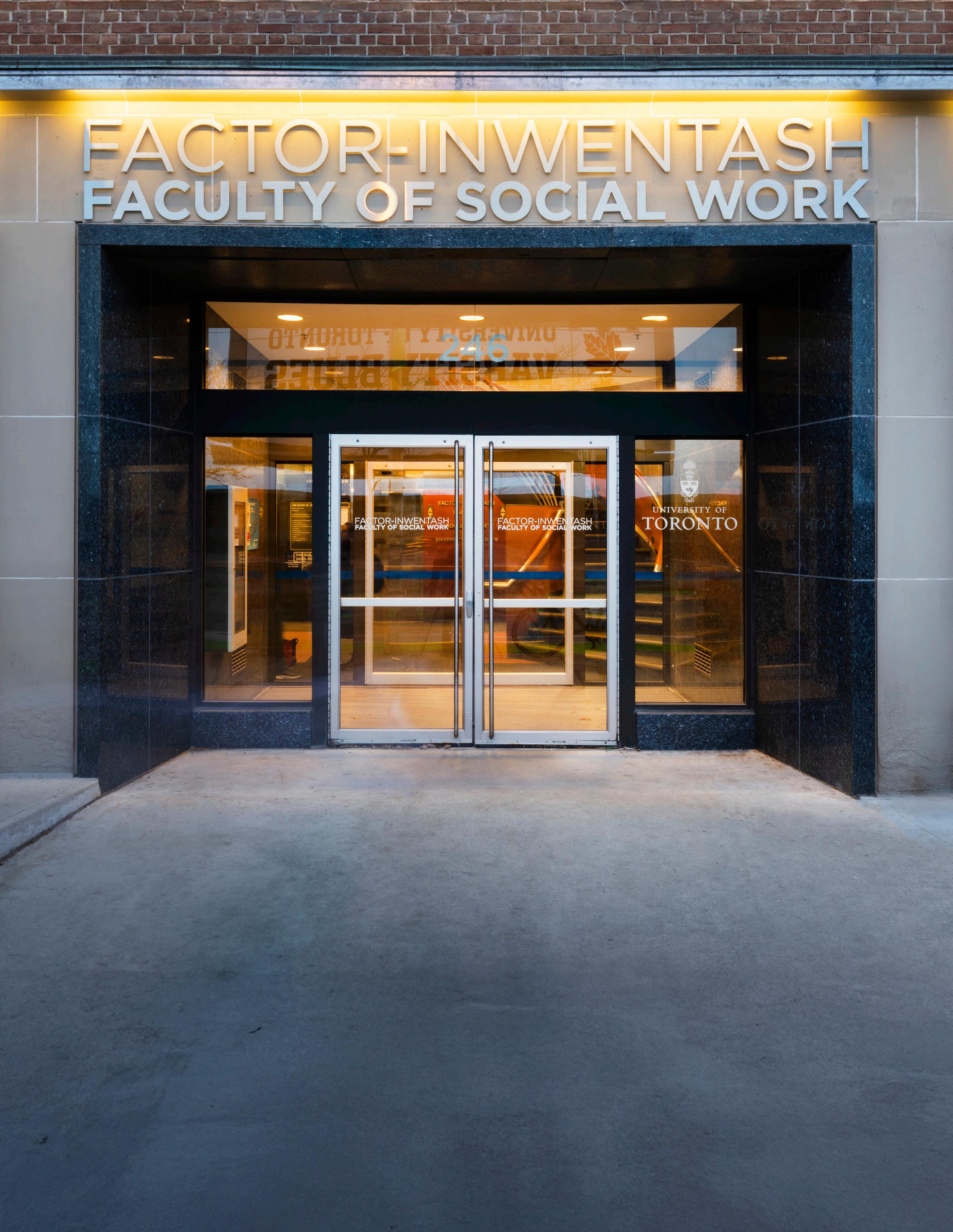


Factor-Inwentash Faculty of Social Work
2025-2030 Academic Plan












We wish to acknowledge this land on which the University of Toronto operates. For thousands of years, it has been the traditional land of the HuronWendat, the Seneca, and the Mississaugas of the Credit. Today, this meeting place is still the home to many Indigenous people from across Turtle Island and we are grateful to have the opportunity to work on this land.
The Factor-Inwentash Faculty of Social Work is located on Treaty 13 territory. We acknowledge our responsibility to deepen our understanding of the histories of Indigenous peoples and to educate our students about the role that social work has played in perpetuating harm and intergenerational trauma. We are dedicated to confronting the ongoing racism and oppression that exist within our field and our communities. Together, we are committed to working collaboratively with Indigenous communities in the pursuit of truth and reconciliation.
The Factor-Inwentash Faculty of Social Work at the University of Toronto has firmly established itself as a national and global leader in social work education, research and practice innovation.
We are proud to be ranked the #1 school of social work in Canada and the #2 school of social work internationally by the Center for World University Rankings. Our faculty members are internationally recognized as some of the most impactful in the discipline. And our strength in teaching is evidenced by our graduates, who occupy leadership positions in social work practice and serve as faculty members in universities around the world.
These accomplishments reflect the significant progress across all four strategic directions identified in our 2017 Academic Plan: Transforming Lives, Connecting Communities:
• Our commitment to mobilizing knowledge is demonstrated by our status as the #1 school in the world for social work publications and by the translation of our scholarship into impactful practice. Faculty initiatives making a direct impact on the lives of people in our communities include the Talk it Out counselling clinic, the RISE program to prevent the mistreatment of older adults, the Centre for Research and Innovation for Black Survivors of Homicide Victims (The CRIB), and the International Partnership for Queer Youth Resilience (INQYR) — just to name a few.
• We have acted on our ambitions to promote well-being and equity through research programs addressing diverse populations and contexts, and through organizational initiatives (such as the Black student application program and the Indigenous student application program) to increase the diversity of students entering our master’s and doctoral degree programs. This work, in turn, has expanded the diversity of social work leaders in the field and increased access to culturally attuned care in our communities and universities.
• We have fostered innovative learning by cultivating research and practice that bring innovation and excellence into our classrooms, expanding the range of experiences available in our field placements, and nurturing six innovative fields of study that offer excellent experiential education, including training via the internationally-recognized Toronto Simulation Model. Associate Professor Keith Adamson’s course on social work and disability practice, for example, invited members of the disability community to co-develop and co-teach the course.
• Finally, our ambition to collaborate locally, nationally and globally is reflected in the multiple partnerships we have cultivated with local and global community agencies, scholars and human rights organizations to further social work research, education and advocacy.
Building on these successes, FIFSW’s new academic plan, Leading Transformative Change through Innovation, Education, and Collaboration, outlines our vision for 2025-2030. Developed through extensive consultation with our stakeholder groups, this plan builds on our strengths, responds to the challenges and opportunities ahead, and addresses the evolving needs of the communities we serve.
Our new plan was developed with the awareness that we are emerging from a global pandemic that has exposed and exacerbated social inequities and taken a tremendous toll on health and social services. It unfolds against a backdrop of polarizing political tensions and tangible attacks on agendas that advance social justice, which is a founding principle of social work practice.
In response, we intend to deepen our commitment to our values by broadening areas of scholarship and practice, increasing leadership and outreach, and exploring new areas of study to strengthen and expand partnerships, enhance creativity and create space for collective thriving. Our mission is more crucial than ever.
Over the next five years, we intend to build on the Faculty’s success by addressing complex social problems, cultivating relationships and building environments that will lead to impactful social change. Central to our vision is the ongoing importance of collaboration — with our community partners, practitioners, clients and service users, other disciplines, and the broader community.
As we look to the future, we recognize both our responsibility and our opportunity to lead. This Academic Plan outlines the directions, values/principles and goals that will guide our efforts.
Our 2025-2030 academic plan represents an unwavering commitment to leading transformative change. We believe social work can drive progress toward truth and reconciliation, social justice, equity and well-being for all. We invite you to join us in this achieving this goal.
“Central to our vision is the ongoing importance of collaboration with our community partners, practitioners, clients and service users, other disciplines, and the broader community.”

Charmaine C. Williams Dean & Professor
Sandra Rotman Chair in Social Work Factor-Inwentash Faculty of Social Work University of Toronto
Social justice is embedded in social work’s DNA. It is identified as a core value or guiding principle by all the associations that guide and regulate the profession at the provincial, national and international level.
“Social work education, scholarship, research, policy and practice are reflexive, contextual, and critical processes embedded in a social justice stance and demanding professional accountability to diverse populations.”
— The Canadian Association for Social Work Education (CASWE-ACFTS)
Social Work’s national and professional commitment to Truth and Reconciliation
“CASW has committed to applying a reconciliation lens to the re-visioning of foundational documents, to bring humility and accountability to social justice efforts, and to give precedence to Indigenous voices and causes. Social workers must have access to education and information to help advance reconciliation and decolonization in their own practice.”
— Statement of Apology and Commitment to Reconciliation, Canadian Association of Social Workers, Fall 2019
Established in 1914, the first school of social work in Canada

Two-year and Advanced Standing Master of Social Work (MSW) programs
#1 school of social work in Canada* #1 in number of social work publicationsº
11 Endowed Chairs
38 faculty members
#2 school of social work in the world*
*Source: Centre for World University Rankings
º Source: Clarivate Analytics
In the 2023-2024 academic year, FIFSW faculty members were engaged in 50 active research projects, totalling $5.3 million in funding
First social work PhD program in Canada

6 fields of study offering specialized training
Over 360 practicum sites and 550 field instructors, with new partnerships growing each year
5 Canada Research Chairs
Unique Indigenous Trauma and Resiliency field of study, offered in partnership with the Ontario Federation of Indigenous Friendship Centres and the Middelton-Moz Institute
A founder and world leader in simulation-based learning for social work
Anchored in principles of equity, social justice and inclusion, the Factor-Inwentash Faculty of Social Work is reaching new levels of excellence in social work teaching, research and practice to boldly support the health, wellbeing and empowerment of diverse communities, as well as meet new and complex social challenges in Canada and across the globe.
Grounded in social justice, human rights and a dedication to promoting health and well-being in communities, the Factor-Inwentash Faculty of Social Work aims to set new global standards in innovative social work research, teaching, leadership and practice — enabling us to be at the forefront in addressing some of today’s most pressing social challenges.

The Factor-Inwentash Faculty of Social Work promotes the health and well-being of individuals, families and communities in local and global contexts by conducting rigorous research and scholarship, educating ethical and skilled social work leaders and change-makers, and working alongside communities and across disciplines to co-create and advocate for evidence-based practice and policies that advance truth and reconciliation, social and environmental justice, human rights and equity.



innovative, rigorous research
Assistant Professor Jia Xue received the Deborah K. Padgett Early Career Achievement Award at the 2025 Society for Social Work and Research (SSWR) Conference in Seattle, marking the first time this award has been given to a scholar from a Canadian university. The award recognizes individuals who are engaged in innovative scholarship, have embraced a rigorous approach to social work research, and are an emerging influence in the field. Xue’s groundbreaking scholarship linking AI, social media and social justice is advancing the profession, particularly in areas related to marginalization, oppression and privilege.

A lot of Chinese people have suffered from anti-Asian racism, especially since the pandemic began. I just want their collective voices to be heard. We want to start a larger conversation and use the research to support families and social work practitioners in the future.”
— Vivian Leung (PhD 2022), speaking about her PhD dissertation
FIFSW professors among the world’s most impactful social work scholars
FIFSW researchers Cheryl Regehr, Faye Mishna, Ramona Alaggia and the late Marion Bogo are among the top 100 most impactful global contributors to social work journal scholarship, according to a study published in the Journal Research on Social Work Practice. The University of Toronto has the second highest number of social work scholars in the top 100, tied with Washington University in St. Louis.
— Hodge, D. R., & Turner, P. R. (2022). Who are the Top 100 Contributors to Social Work Journal Scholarship? A Global Study on Career Impact in the Profession. Research on Social Work Practice, 33(3), 338-349.

We believe individuals, families, and communities have a right to live in environments that promote safety, health, well-being and full participation in society.
We value rigorous research as a foundation for evidencebased advancements in policy, advocacy and practice.
We honour diverse perspectives, including Indigenous and decolonized ways of knowing, as essential to the creation of knowledge.
We are committed to collaboration with client communities and the integration of knowledge gained from lived experience in all aspects of our work.
We recognize the importance of fostering local, global, and interdisciplinary partnerships to address complex social issues.

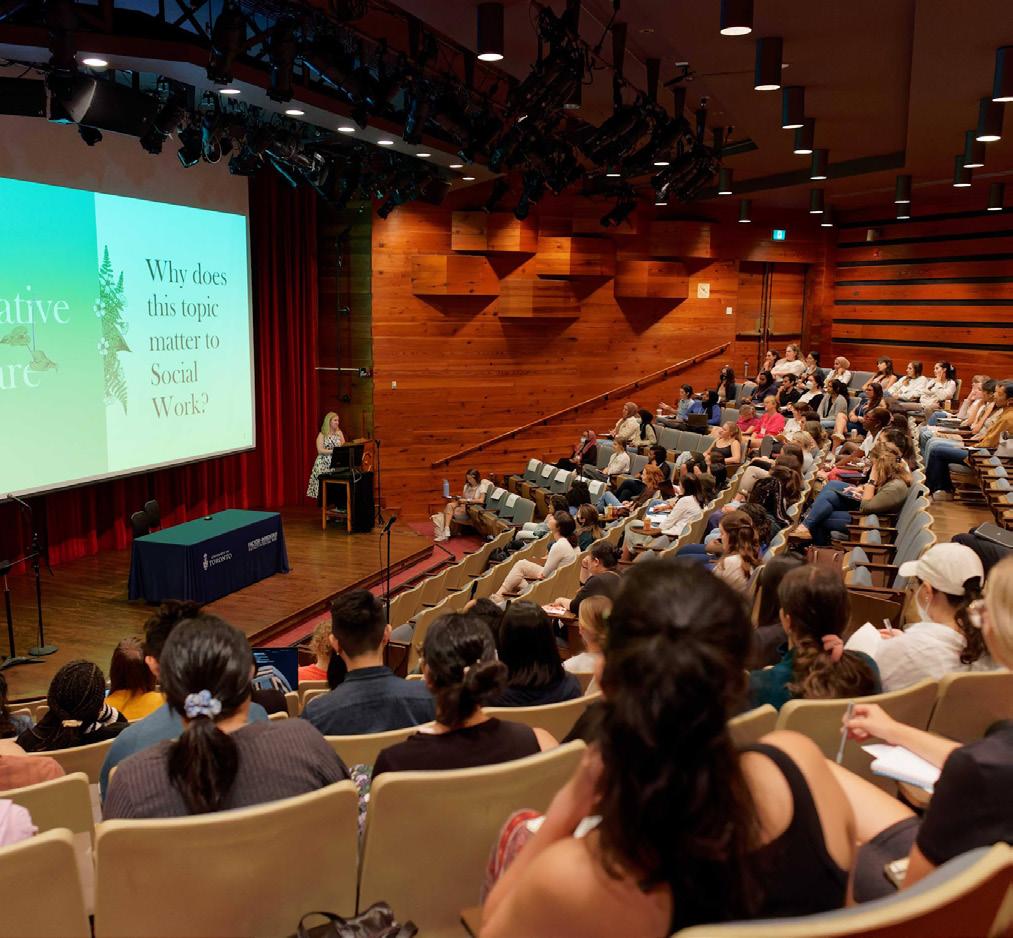
Today, when many are trying to close the door on discussion of equity and justice, it is imperative that social workers take informed action to support their communities. Research, education, advocacy and awareness of key social issues, whether in the interests of an individual client or in the interests of many, are crucial to social work’s core mission.
Social work practitioners and researchers meet people where they are — physically, emotionally and socially. Whether in schools, hospitals, community services, longterm care homes, social enterprises or libraries, they are present in the spaces that matter most, offering support, expertise and hope.
Addressing today’s challenges through a social work lens requires versatility, accessibility and collaboration. It also requires a strong understanding of the social determinants of health and well-being and a deep and unwavering commitment to empowering a diversity of voices. Interdisciplinary by nature, with the ability to view issues at both micro and macro levels, social work leaders are well positioned to convene conversations, inspire collaboration and guide much-needed change. The Factor-Inwentash Faculty of Social Work is playing a key role in fostering these qualities and expanding what the field can achieve in empowering people and communities.



A widespread mental health crisis is happening right now, and social workers are vital to supporting individuals and families through that crisis.”
— Amar Ghelani, Assistant Professor, Teaching Stream, and former frontline social worker supporting individuals struggling with addiction and mental health
FIFSW’s 2025-2030 academic plan was developed through a highly engaged process that unfolded over three distinct phases and involved extensive consultations with a wide range of stakeholders, including faculty, staff, students, alumni and partners. Our process was facilitated by The Potential Group, a firm specializing in supporting institutions to create strategies that promote sustainability, equity and inclusion.
The first stage of consultations focused on exploring broad, foundational questions about FIFSW’s unique contributions and potential areas for future impact. This stage saw significant participation, with 96 people participating in focus groups and a survey completed by 238 respondents. These activities aimed to gather diverse perspectives on what makes FIFSW distinct and how it can best position itself to lead in social work education and practice.
Stage two of the consultation process took place from April to June 2024, with faculty, staff, students, alumni and community collaborators participating in a series of gatherings. Each session delved deeply into one of four key strategic questions:
• How do we shape the future of social work as a discipline?
• What does the future of applying a critical EDI lens to research, teaching and delivery of social, human, and health services look like?
• What experience of “learning and becoming” do we want to create in classroom, fieldwork and other learning spaces?
• Where is FIFSW being called to lead the research and practice of social work?
This phase involved an average of 36 voices in each group.
We took the resulting high-level strategy framework into further consultation in the Fall of 2024, seeking review and feedback at meetings of staff and faculty members, the Dean’s Advisory Council, and Faculty Council and its standing committees.
5 strategic directions
Advance diverse approaches to promoting social justice, environmental justice and human rights. 1. 2. 3. 4. 5.
Amplify the local, national and global impact of our research and knowledge development.
Codesign innovative and excellent learning experiences.
Mobilize relationships with practice communities.
Foster collective thriving across the Faculty and the field.


My work with The CRIB constantly reminds me of my ‘why’. It keeps me connected to the reason I’m pursuing this level of education and asking these questions. It’s not about me at all. It’s about my community.”
— Elo Igor, PhD student and Project Coordinator for the Centre for Research & Innovation for Black Survivors of Homicide Victims (The CRIB), led by Associate Professor Tanya Sharpe
Goal: Build on our strength in research by emphasizing and increasing its impact on practice, leadership, policy development, research and education at local, national, and global levels
• Enhance our capacity to amplify the value of social work perspectives and leverage our collective research and knowledge development to influence positive social and environmental change locally and globally.
• Promote the expansion of social work knowledge by embracing multiple ways of knowing, and integrating lived experiences, Indigenous ways of knowing, and critical paradigms with our strengths in rigorous, empirical research.
• Cultivate community-based and community-engaged research that centers client and community voices, and increases creative, accessible approaches to knowledge exchange.
• Grow and initiate partnerships across disciplines and professions to address shared areas of interest and advocacy.

As the Director of MFARR-Asia, Professor Peter A. Newman is working with 30 academics and 26 community partners in Thailand, India, Hong Kong SAR, Taiwan, Bangladesh, the Philippines, Singapore, Canada, the U.K. and the U.S. The multidisciplinary research partnership is helping build the next generation of researchers on LGBTIQ human rights issues in Asia. “Part of the vital progress we’re making in the region is through the development of our own team,” he says. “In Canada, we sometimes accept as a given our ability to openly pursue LGBTIQ scholarship and advocacy, but this is not the case in many academic institutions in Asia.”
In collaboration with its partners, MFARR-Asia has helped inspire the inclusion of gender-affirming hormone therapy and surgery in India’s health insurance plan, expanding health insurance coverage among an estimated 4.8 million trans people.
First published in 1993 and reproduced every 5 years since then, the Ontario Incidence Study of Reported Child Abuse and Neglect (OIS) has revealed hard truths related to racism and deep inequalities for First Nations communities, as well as Black, Latin American, and other racialized communities in the child welfare system. Led by Professor Barbara Fallon, the research is a necessary step to addressing injustice. “This type of data allows us to push for change at those systemic levels often held within government policies and legislation,” says Cindy Blackstock (PhD 2009), executive director of the Caring Society. For Fallon — who holds a Canada Research Chair in Child Welfare and is U of T’s Associate Vice-President, Research — ensuring “the highest quality data” is an important “part of a program of social justice.”



With the goals of healing, reconciliation and cultural restoration, it is imperative that child welfare agencies support the development of positive cultural identity, spirituality, and connection to cultural communities for Indigenous children, youth and their families.”
— Ashley Quinn, Assistant Professor From the publication: Quinn, A. L. (2022). Experiences and well-being among Indigenous former youth in care within Canada. Child Abuse & Neglect., 123.

Thanks to the generous support of donors, FIFSW has established the Lee Wu Kee Ming Chair in Indigenous Social Work. With expertise in Indigenous social work education and Indigenous methodologies, the new chair will work proactively with communities, government organizations and agencies to develop innovative solutions to confront the marked inequities that exist between Indigenous and non-Indigenous populations. The Chair will also facilitate the implementation of Indigenousrelated research into policy and practice.

Goal: Collaborate with students, educators, instructors, client communities and mentors to create innovative social work and interprofessional learning experiences that connect research, ethics and practice, and embrace diverse ways of learning and being.
• Activate models of co-creating learning with students, client communities, instructors, researchers, and community-based educators.
• Engage faculty research, the best available knowledge, and emerging technologies to design innovative, impactful experiences in classroom and field learning.
• Amplify opportunities for student-engaged and student-led research and knowledge building.
• Cultivate collaborations and scholarship that will design leading-edge social work education that equips graduates to demonstrate the highest level of preparedness for professional and academic careers.
• Enhance capacity in the Faculty and the field for lifelong learning to promote responsive, competent, ethical practice and policy.

FIFSW’s Talk It Out Counselling Clinic was established at U of T during the COVID-19 pandemic in response to increasing challenges to mental health equity. Operating on the principles of antioppression and trauma-informed care, and using a community-engaged model, the Clinic trains Master of Social Work students to deliver culturally responsive mental health counselling and community initiatives to those who encounter multiple systemic barriers to care. In collaboration with local community agencies, the Faculty-run clinic addresses critical gaps in mental health support while also offering high-quality direct-practice practicum opportunities for MSW students.
In 2022, Associate Professor Keith Adamson was recognized with an Early Career Teaching Award from U of T for his innovative work collaborating with community members on course development and delivery. His course “Social Work and Disability Practice” included clients and families with lived experience as co-instructors. Now, he is working with the Council on Social Work Education (CSWE) on the development of new guidelines on service user involvement in social work education. “Relationships are essential to my teaching philosophy,” Adamson told U of T News. “For me, the educational alliance is caring about your students and helping them be the best clinician possible.”
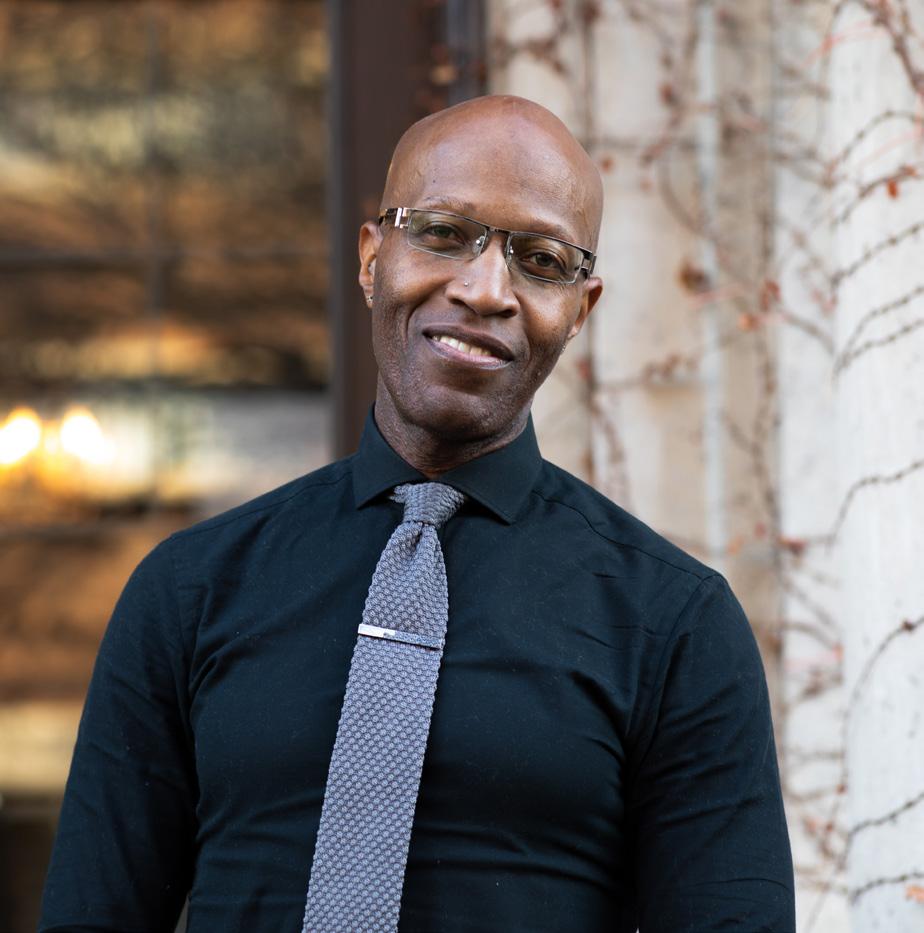


My placement working with patients and families at a long-term care facility reinforced my sense that I was meant to be a social worker. My heart was there because it was tied to my lived experience, but also because I immediately knew there was power in the skills I was learning from the MSW program.”
— Vithusan Arunakirinathan (MSW 2024)
Goal: Foster generative connections with the Faculty, alumni, practitioners and policy-makers to promote ongoing learning, strengthen evidence-based practice, and advance meaningful change.
• Grow and cultivate relationships with alumni, students, and the field to generate mutually beneficial learning experiences and research partnerships.
• Build relationships between the Faculty, practitioners and service organizations to develop practiceinformed research, education and advocacy.
• Facilitate the growth of field-generated knowledge building and practice innovation.
• Collaborate with practice communities to establish FIFSW as a hub for leading-edge professional and doctoral education for social workers and allied professionals.
• Partner with community and public sector leaders in Canada and across the world to identify and mobilize research that will have the biggest impact on practice, policy and system change.

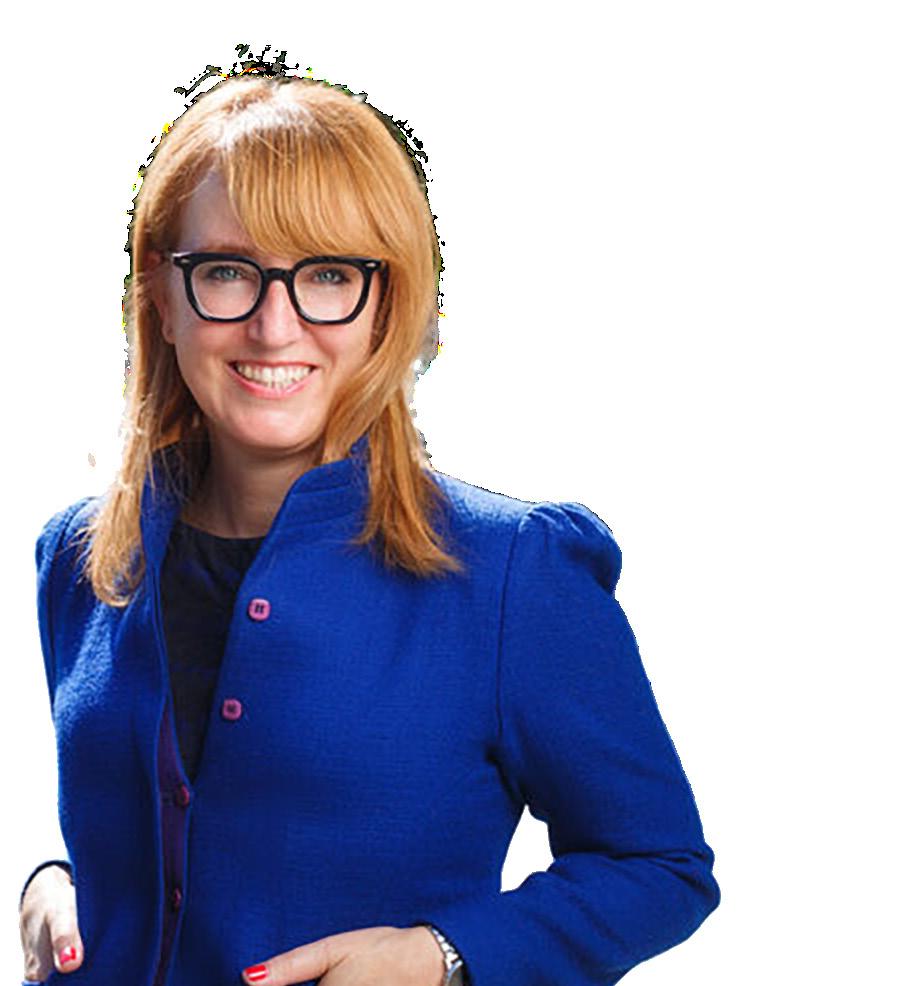
Our vision is to redefine the landscape of primary care by not only recognizing the critical work already being done, but also by providing recommendations that would integrate social workers more deeply into health-care teams.”
— Rachelle Ashcroft, Associate Professor; Project Lead, Creating a National Vision and Building Capacity for the Role of Social Work in Primary Care

With one in 10 adults aged 65 and older reporting that they experienced some form of abuse each year, developing and testing interventions to prevent the mistreatment of older adults is vital. RISE, a community-based elder mistreatment response program, led by Professor David Burnes in partnership with Elder Abuse Prevention Ontario, works with other institutional systems, such as adult protective services, legal/justice, law enforcement and health care, to support and respond to cases involving older adults who are at risk of or experiencing elder mistreatment or selfneglect. In 2024, the Government of Canada announced nearly $800,000 in funding to implement and evaluate the program.

In June 2025, Professor Ramona Alaggia launched the Child and Youth Trauma Research Incubator (ThRIve) Lab thanks to support from the Canadian Foundation for Innovation and the Ontario Research Fund – Research Infrastructure. Part of a new network of eight Canadian universities, the ThRIve Lab aims to make a difference for children and youth exposed to trauma. Bringing together researchers, practitioners, community partners and students, this research incubator will further the mission of the Canadian Consortium on Child and Youth Trauma to improve the lives of mistreated children and youth. Research from the lab will inform provincial policies and practices to “create consistency in the training provided to social workers, police officers, legal professionals and health-care providers working directly with the children and families involved.”
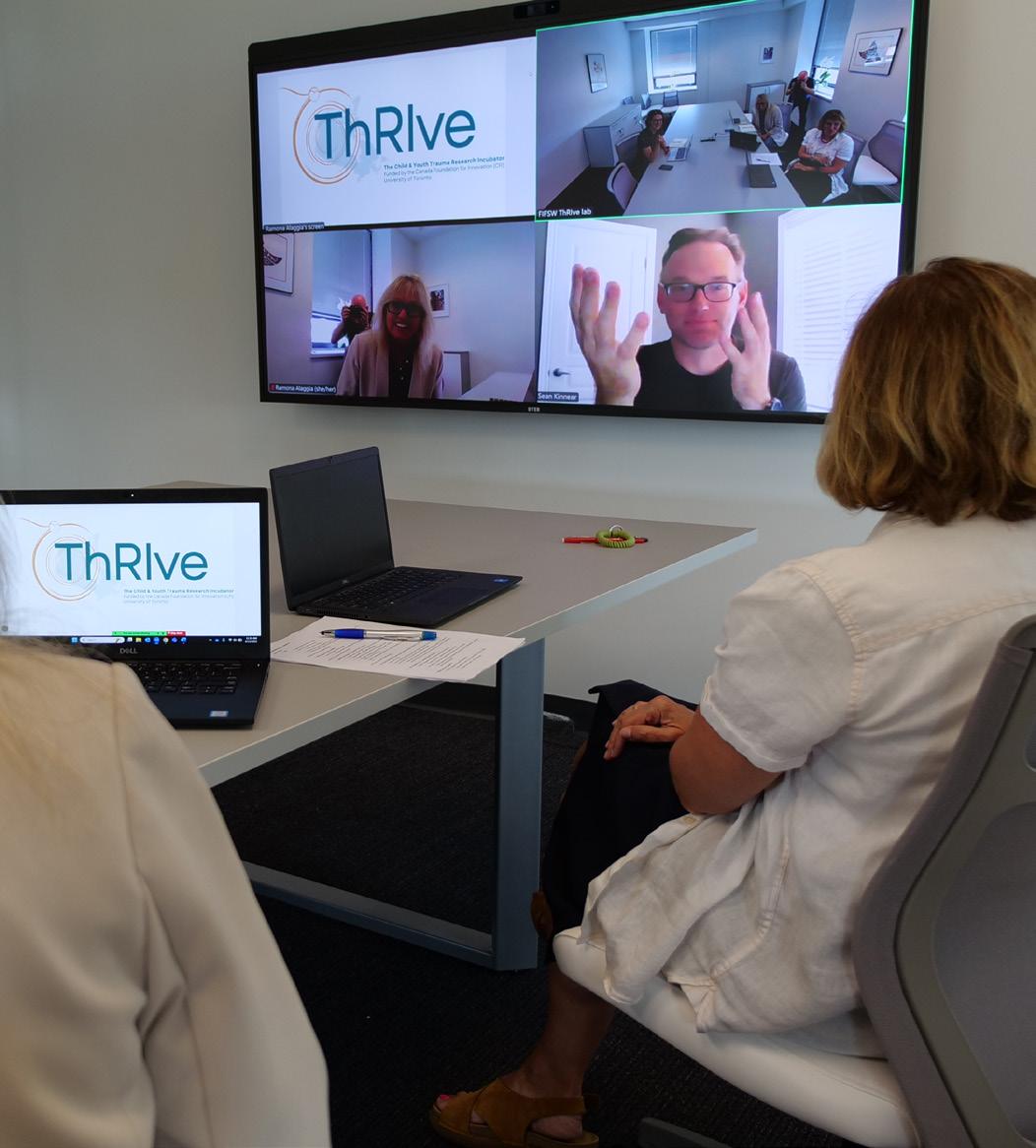
Goal: Cultivate an environment that enables everyone connected to the Faculty to grow and thrive.
• Continually explore ways to strengthen resources and relationships for wraparound student support and success, including financial support, student awards, mental health and physical well-being, and community building.
• Strengthen knowledge, resources and practices to support the health and well-being of instructors, staff and faculty members, and others who support the Faculty mission.
• Collaborate with alumni, practitioners and organizations to develop and amplify practices that promote health and well-being for people in the field.
• Design curricular and co-curricular programming to develop professional capacities and skills that will facilitate student success in transitioning to post-graduate careers and opportunities.

Named in honour of Bertha Rosenstadt, one of the first Jewish women to graduate from the University of Toronto, the Bertha Rosenstadt Trust Fund in Health Research supports active field practicum partners who wish to conduct research, developed in consultation with FIFSW, that expands social work field education knowledge. Since its establishment in 2015 to celebrate FIFSW’s 100th anniversary, as of 2025, a total of 38 grants have been awarded.


An important part of the ITR program is looking at our own well-being and the impact of trauma and creating a support network around each other.”
— Folashade Kortee, (MSW Indigenous Trauma and Resiliency [ITR] Field of Study 2024)
$2.7 million in financial support for students in the 2023-2024 academic year (including donor-funded awards, financial aid and emergency funds, non-FIFSW funded awards and PhD funding)
2 School of Continuing Studies courses
3 Massive Open Online Courses
11 alumni events (2023-2024 academic year)
The Social Work Speaks Out project, developed by Professor Shelley Craig and collaborators, surveyed more than 1,000 LGBTQ+ students in 126 social work programs across 44 states and seven provinces. The project has contributed to the development of best practices for affirmative social work education: Craig co-developed a tool to help educators effectively address microaggressions against LGBTQ+ students in their classrooms and coauthored guidelines for the Council on Social Work Education on enhancing the climate for transgender and LGBTQ+ social work students. A publication based on research from the Social Work Speaks Out project received the 2022 award for Best Qualitative Article from the Journal of Social Work Education.

Goal: Everyone engaged with the Faculty will gain greater capacity for leading and supporting change across local, national and global spheres.
• Build capacity for social workers as change-makers and leaders, in classrooms, leadership and practice spaces.
• Integrate environmental justice, human rights and social and structural determinants into social justice research, teaching and practice.
• Recognize and promote epistemic justice by valuing a broad spectrum of research, community partnerships, practice innovation and advocacy.
• Advance impactful research and scholarship to inform and support policy changes that will benefit the communities we serve.
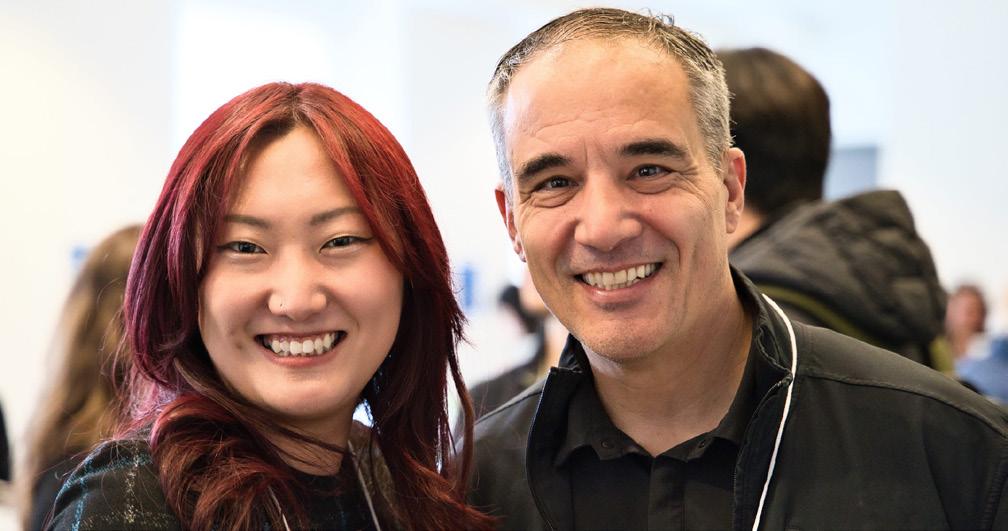
Strengthening the relationship between social work and law
Professor Michael Saini recently completed a term as president of the Association of Family and Conciliation Courts (AFCC), an interdisciplinary and international association of professionals working in and with family law systems who are dedicated to improving the lives of children and families through the resolution of family conflict. Saini is one of only five Canadians to become president in the organization’s 61-year history and one of three social workers to take on the role.


Engaging with students, faculty and fellow panellists reminded me that change in this profession doesn’t just happen – it’s built through the voices and actions of those willing to challenge the status quo.”
— Marci Gray, PhD student, panellist, Black Futures in Social Work event


How is climate change affecting the communities that social workers work for and with? Professor Carmen Logie — Canada Research Chair in Global Health Equity and Social Justice with Marginalized Populations and an Adjunct Professor at the United Nations University Institute for Water, Environment & Health — has been working to answer this question through research with communities around the world. From Uganda and Kenya to Thailand and India, and Indigenous communities in Canada’s Northwest Territories, Logie has uncovered strong links between climate change and mental health, sexual health and HIV risk.
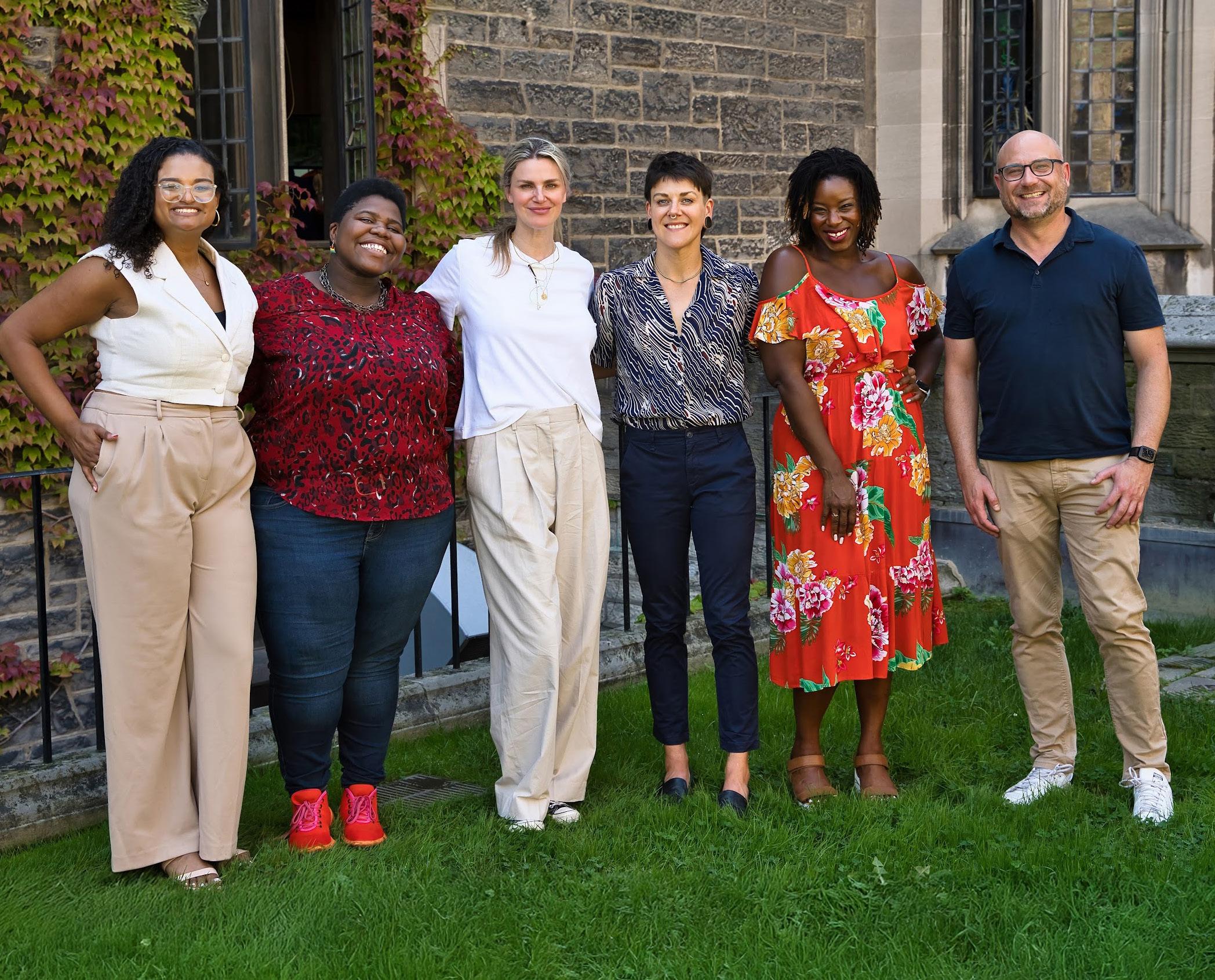

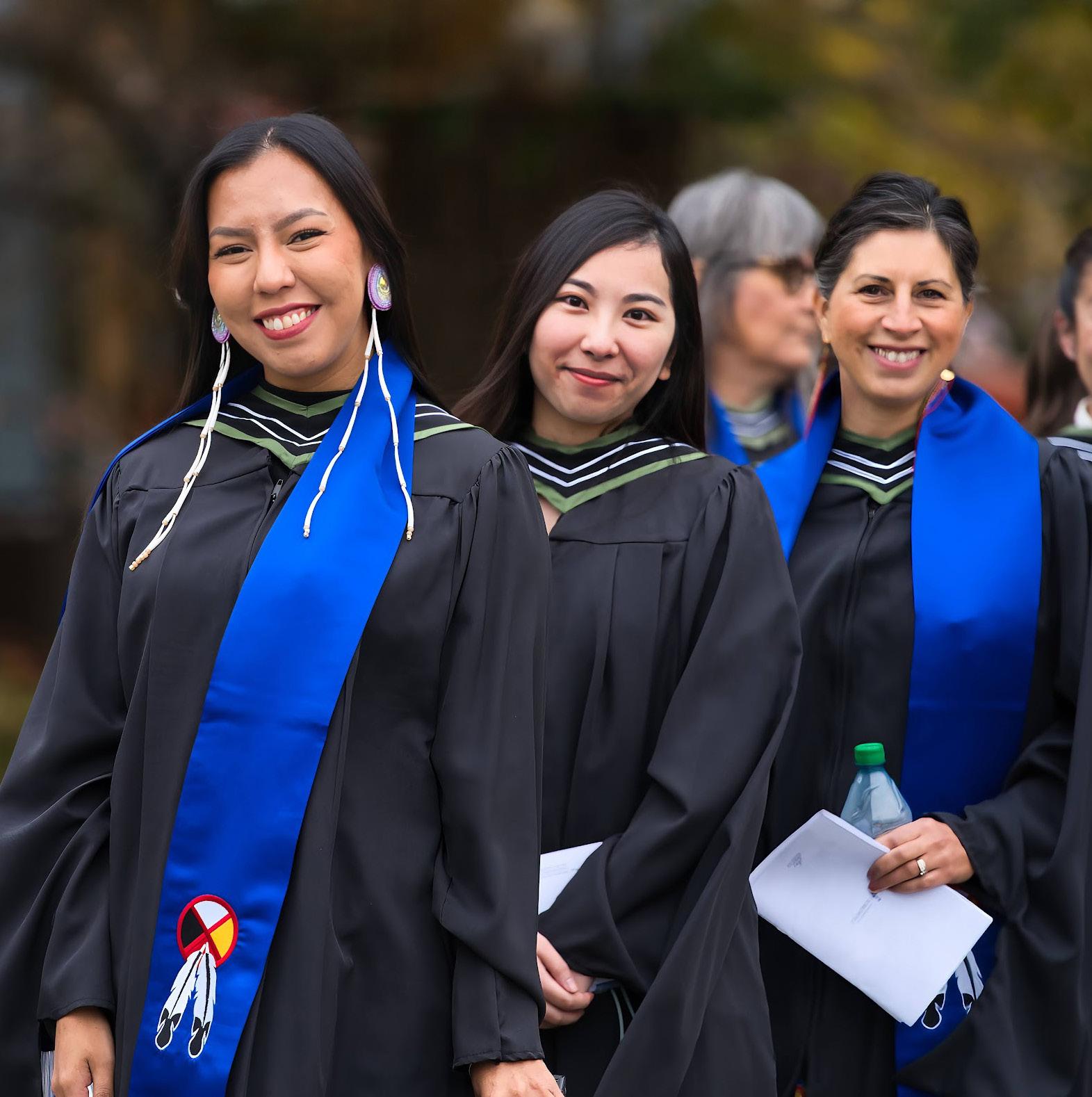
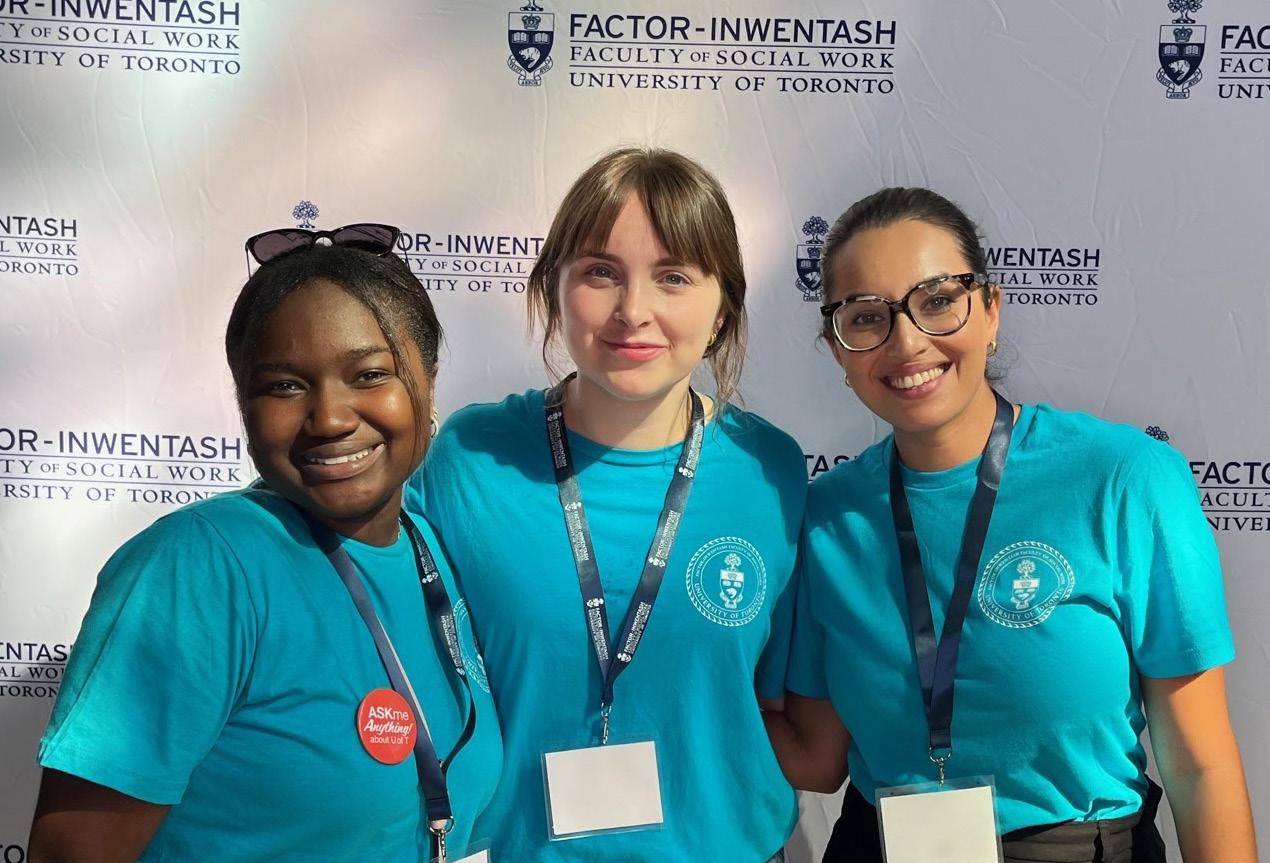





The Factor-Inwentash Faculty of Social Work’s 2025-2030 Academic Plan invites you to reimagine what is possible in social work research, education and practice. Our five strategic directions are not just aspirations; they are a call to action for everyone who believes in the power of social work to lead and collaborate with others to create a more just, equitable and compassionate world.
Now is the time to harness our collective energy creativity and commitment. Guided by FIFSW’s vision, mission and values, we are determined to break new ground, challenge the status quo, and champion the voices and needs of the communities we serve. We invite you — our students, faculty, staff, alumni, partners and supporters — to join us in bringing this plan to life. Together we can set new global standards for social work impact and ensure that we are leading transformative change that enables all members of our communities to thrive.
Discover how you can be part of bringing our transformative 2025–2030 Academic Plan into reality.
Connect with us at fifsw.impact@utoronto.ca #socialworktransforms
